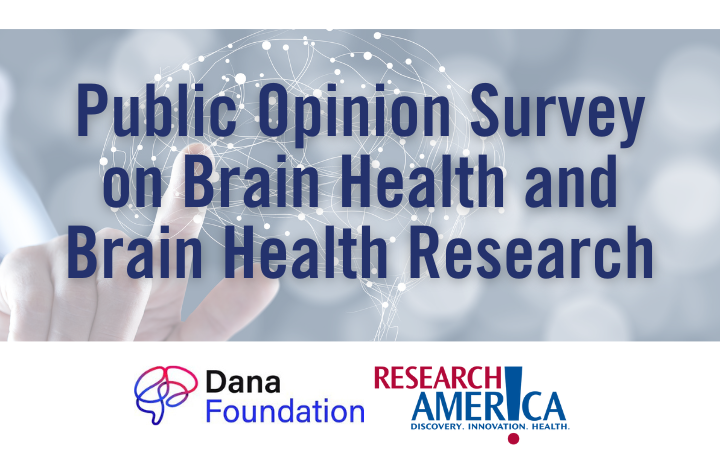Survey Finds Americans Curious and Optimistic About Brain Health Research

Also Finds Concerns, a Knowledge Gap, and Desire for Patients to Have More Input in Setting Research Priorities
January 2023 Update — read our Executive Overview of the Brain Health Survey.
Brain health issues directly impact more than 8 in 10 Americans, according to a new survey released today; 82% of respondents said they know someone or have themselves experienced at least one brain disorder or mental health condition. Commissioned by Research!America in partnership with the Dana Foundation, the August 2022 national survey captures Americans views on brain health and brain health research. (View slide deck of survey results.)
Despite the widespread personal impact of brain health issues, 66% of respondents reported having little or no knowledge about brain health research. Of interest is that the same percentage of respondents, 66%, indicated strong curiosity to learn more. Respondents also displayed striking optimism about the promise of brain health research:
- 91% of respondents, across all demographics (including political affiliation), agree brain data is a valuable tool to understand and improve their health.
- 89% agree brain health research might develop a way to correct brain damage.
- 89% agree brain health research might deliver better treatments for brain diseases and mental illnesses.
While Americans feel positive about the possible outcomes of brain health research, concerns include: possible misuse of data (64%), unwanted brain manipulation (61%), risk of injury (58%), and potential social stigma for participants (56%). Nearly two-thirds (62%) of Americans want patients to have more of a voice in setting research priorities.
These concerns don’t appear to significantly dampen enthusiasm:
- 2 in 3 respondents say that despite potential risks, brain health research will have an overall benefit to society (68%). African Americans are more likely to say that there are too many risks involved (28% as compared with 16% of total respondents).
- Americans across party lines are strongly in favor of increased federal funding for brain health research (78%) and favor having the federal government incentivize private sector investment to find treatments and cures for diseases (80%).
“This survey reinforces longstanding, American support for advancing research for health and reveals the desire of the public to better understand and engage with brain health research,” said Research!America President and CEO Mary Woolley. “By studying public opinion on brain health research, the Dana Foundation can assist the research community in its efforts to be more aware of concerns and meet Americans’ interests for greater understanding and engagement.”
Additional highlights from the Dana Foundation/Research!America survey include:
- 56% say advances in brain health should inform policy decisions and legislation.
- 84% say brain data should have the same privacy protections as other health information.
- 59% of respondents chose the word “hopeful” to reflect their attitude toward brain health research; 39% chose the word “cautious”.
- Respondents are split on whether adequate safeguards are in place to ensure brain health research is ethically conducted: 45% said there are adequate safeguards, 29% said there are not, and 26% were unsure.
- In comparison to another survey conducted in 2019, nearly double the respondents report having participated in any kind of research (reported participation in clinical trials increased from 7% to 13%).
- Respondents ranked the opportunity to improve individual health (68%) and the possibility of curing serious diseases (58%) as the top motivators for participating in brain health research.
“The Dana Foundation partnered with Research!America to gain a deeper sense of public understanding and perceptions of neuroscience. The survey results support the need for increased education on brain health, and for the inclusion of public voices — especially those of patients — in research,” said Dana Foundation President and CEO Caroline Montojo, PhD. “We also recognize that Americans are hopeful and optimistic about brain health research, but it is critical to address ethical and societal considerations that accompany these scientific advances to strengthen public trust and support for research.”
Survey Methodology: The nationwide online survey was conducted by Zogby Analytics on behalf of Research!America in August 2022 among 1,023 adults, plus 1,218 additional adults for minority population oversampling. The survey has a theoretical sampling error of +/- 3.1 percent. The theoretical sampling error was higher for subgroups.
For questions about the survey, or to set up an interview with Mary Woolley, contact Tim Haynes, Senior Director of Communications for Research!America, at 571-482-2737 or [email protected] with press inquiries; to set up an interview with Caroline Montojo, PhD, contact Ann Whitman, Director of Communications for the Dana Foundation, at [email protected].
# # #
About the Dana Foundation
The Dana Foundation is a private philanthropic organization dedicated to advancing neuroscience and society by supporting cross-disciplinary intersections such as neuroscience and ethics, law, policy, humanities, and arts. The Foundation explores the connections between neuroscience and society’s challenges and opportunities, working to maximize the potential of the field to do good. Visit www.dana.org.
About Research!America
Research!America is a non-profit medical and health research advocacy alliance which advocates for science, discovery, and innovation to achieve better health for all. For 30 years, Research!America has been commissioning surveys to help understand public support for medical, health, and scientific research, among other state, national, and global issues related to public health and research and innovation. Visit www.researchamerica.org.




